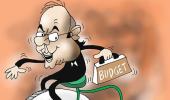'Will Mr Jaitley listen, or is that expecting too much in pre-election season?' asks T N Ninan.

K P Geethakrishnan, finance secretary in the early 1990s, is credited with having called the Budget a Fudget -- a reference to how the fiscal deficit was no different from many companies' profit announcements: Someone's version of the facts.
Following the subsequent Budget presentation and before the cameras rolled at the follow-through TV show, your columnist asked the then chief consultant in the finance ministry, Ashok Desai, how much of a fudge the latest Budget numbers were.
His typically crisp reply: "We have reduced the fudging by 50 per cent."
Today, of course, Fudget is an app for managing your personal finances.
At the time the government was under pressure to meet conditions tied to a loan from the International Monetary Fund, one condition being the size of the deficit.
In the early 1980s, there had been a previous IMF loan arrangement, and deficit targets to be met.
In the event, the government did not draw the final tranche of that loan.
This was presented at the time as an achievement, the claim being that India had got over its foreign exchange problem earlier than expected.
The truth, as one of the finance ministry's then dramatis personae confided years later, was that the government, having fudged fiscal numbers to keep the IMF happy, found it impossible to continue doing so and decided it was simpler to terminate the loan arrangement.
Today there is no IMF loan and no loan conditionality, but the country has a fiscal responsibility law.
This lays out a glide path for reducing the Centre's deficit progressively to 3% of GDP.
The original target date for achieving that has long gone, but government after government has veered from the glide path.
The target dates have been set and re-set, and 'pauses' announced.
When all else has failed, governments have resorted inevitably to more Fudgets.
This last point is the burden of the Comptroller and Auditor General's latest report to Parliament.
It details how various government expense items (like paying for subsidies and providing project finance) have been kept off the books, funded through sundry government-controlled financial agencies, or simply rolled over to the next year.
Since the government follows an archaic cash accounting system that does not recognise future liabilities, the fudge is easy.
Let it be noted that the CAG report has numbers that cover more than the period when Arun Jaitley has been finance minister, and goes back to the days of P Chidambaram.
How can one put the finance minister in more effective corsets? One long-recognised method, in effect recommended by the CAG, is to switch to a system that recognises and reports off-the-books liabilities.
Another is to report to Parliament what is called the public sector borrowing requirement (or PSBR), a system that the British have long followed.
This would present a fuller picture of what the government is up to with money, and recommends itself when it has become evident that the present government's fiscal record, while showing creditable consolidation, is only a part of the story.
What is more, the level of government debt has been significantly understated.
The record of states is in some ways worse, as their deficit levels have climbed.
As Sajjid Z Chinoy of JP Morgan has calculated, the PSBR for the Centre, states, off-balance sheet and government-owned entities, when taken together, was at 8.2% of GDP in 2017-2018 and no different from five years earlier.
One could argue that, if the rate of inflation and the external account are under control, no harm has been done.
But there are two caveats: First, interest rates would drop if governments borrowed less, and that would help growth.
Second, the N K Singh committee has pointed out that the level of government debt, in relation to GDP, is too high.
Mr Chinoy argues passionately for stopping the spate of giveaways being announced, lest they do macro-economic harm.
Will Mr Jaitley listen, or is that expecting too much in pre-election season? The signs so far are not encouraging.










